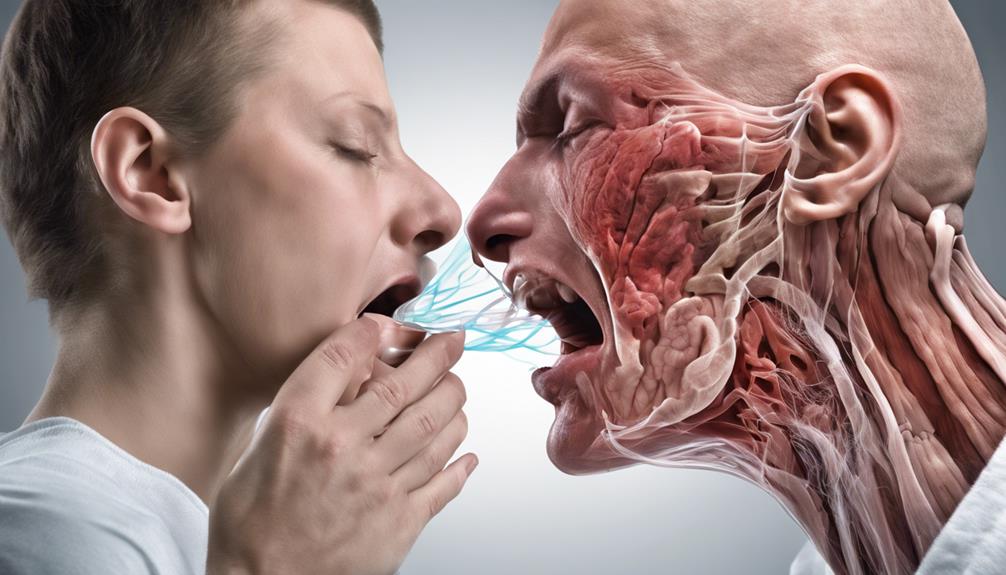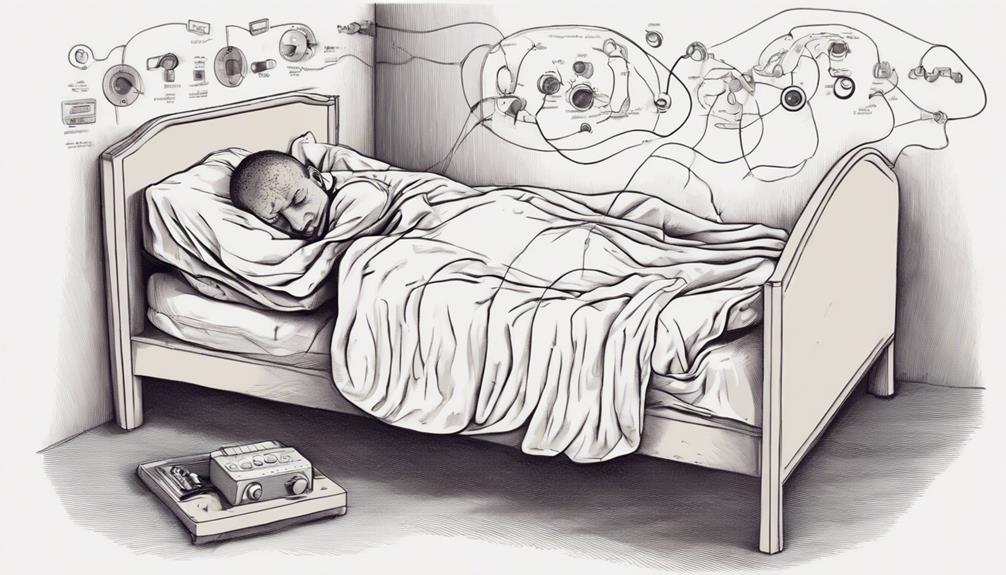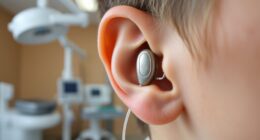Have you ever considered how all the coughing and sneezing going on around us could be affecting our ears?
The subtle but impactful relationship between coughing and hearing loss unveils a complex interplay deserving of attention.
From the intricate anatomy of the ear to the surprising mechanisms at work, understanding this connection could hold the key to safeguarding our auditory well-being.
Stay tuned for an eye-opening exploration of how these seemingly unrelated actions may be more intertwined than we realize.
Key Takeaways
- Coughing affects delicate ear structures and can lead to temporary or permanent hearing loss.
- Increased pressure in the middle ear from coughing can disrupt sound transmission.
- Proactive measures are crucial to safeguard hearing health from persistent coughing effects.
- Seeking medical help for cough-related auditory issues is essential for preserving hearing.
Anatomy of the Ear and Coughing
Understanding how coughing impacts the anatomy of the ear is crucial for recognizing potential implications on hearing health. When we cough forcefully, the pressure changes in the Eustachian tube and middle ear, which can lead to Eustachian tube dysfunction. This dysfunction may cause fluid accumulation in the middle ear, affecting the delicate structures responsible for hearing.
The Eustachian tube, connecting the middle ear to the back of the nose and throat, normally helps regulate pressure in the ear. However, chronic coughing or respiratory conditions can disrupt this balance, leading to complications such as hearing loss.
The inner ear, an essential part of the hearing process, relies on the proper functioning of the middle ear and Eustachian tube. Any disturbances in these areas due to coughing can potentially impact hearing abilities. Recognizing this connection emphasizes the significance of managing respiratory issues to preserve overall ear health and prevent potential hearing complications.
Mechanisms of Hearing Loss via Coughing

Experiencing coughing episodes can directly impact hearing by disrupting the delicate structures in the ear, potentially leading to temporary or permanent hearing loss. The forceful nature of coughing can increase pressure in the middle ear, affecting its ability to transmit sound properly. Chronic coughing poses a risk of damaging the Eustachian tube, which plays a crucial role in equalizing pressure in the ear, thus causing hearing issues. Additionally, prolonged coughing spells can contribute to the development of ear infections, further exacerbating hearing loss.
When cough-induced hearing loss occurs, prompt intervention is essential. Proper treatment options targeting the underlying cause of the cough can potentially reverse the hearing impairment. However, if left untreated, coughing-related complications could result in permanent hearing loss. It's crucial to address coughing episodes effectively to prevent potential long-term consequences on hearing health.
Understanding the mechanisms through which coughing can cause hearing loss underscores the importance of managing cough-related issues promptly to mitigate the risk of permanent damage to the ears.
Impact of Persistent Coughing on Hearing
Persistent coughing can significantly impact hearing health by creating changes in the middle ear's pressure dynamics. This can lead to various ear issues such as alterations in Eustachian tube function, inflammation, and ultimately hearing loss. The increased pressure from persistent coughing can disrupt the normal functioning of the Eustachian tube, which is crucial for equalizing pressure in the middle ear. As a result, sound conduction may be affected, contributing to potential hearing problems. Additionally, chronic coughing can cause inflammation within the ear structures, further exacerbating the risk of hearing loss. Prolonged coughing spells can disturb the delicate balance of pressure in the ear, potentially resulting in temporary or permanent hearing issues. Furthermore, repeated episodes of coughing can induce muscle tension in the ear, which may interfere with auditory perception. It is essential to be mindful of these effects and take proactive measures to protect hearing health.
| Impact of Persistent Coughing on Hearing | ||
|---|---|---|
| Ear Issues | Eustachian Tube Function | Inflammation |
| Hearing Loss | Muscle Tension |
Practical Tips for Hearing Protection

To safeguard our hearing, it's essential to implement practical tips for protection against potential harm caused by persistent coughing.
When in noisy environments where coughing is prevalent, wearing ear protection like earmuffs or earplugs can help shield our ears from excessive noise and reduce the risk of sensorineural hearing loss.
It's crucial to avoid inserting objects into our ears, as this could lead to damage that worsens hearing loss resulting from coughing. Using noise-canceling headphones or earbuds is another effective way to lessen the impact of loud coughing on our auditory health.
Additionally, staying hydrated and practicing good cough hygiene can help decrease both the frequency and intensity of coughing episodes, thus reducing the potential harm to our hearing.
If coughing persists or worsens, seeking medical evaluation is advisable as it could indicate an underlying condition that may affect our ability to hear.
Connection Between Cough and Auditory Health
Coughing affects auditory health by increasing pressure in the middle ear and impacting Eustachian tube function. When we cough persistently, several key mechanisms come into play that can lead to hearing issues:
- Fluid Accumulation: Respiratory infections causing persistent coughing can lead to fluid buildup in the middle ear, hampering sound conduction.
- Inflammation Triggers: Chronic coughing can trigger inflammation in the ear structures, disrupting the transmission of sound waves.
- Pressure Disruption: Cough-induced changes in pressure may upset the delicate balance of the inner ear, potentially resulting in hearing problems.
- Treatment Importance: Addressing the root cause of the cough is crucial in preventing or alleviating any associated hearing loss. Seeking help from a throat specialist can shed light on what's causing the cough and its impact on auditory health.
Understanding the connection between coughing and auditory health can help individuals take proactive measures to preserve their hearing abilities.
Frequently Asked Questions
Can Coughing Cause Hearing Loss?
Yes, coughing can cause hearing loss. Forceful coughing increases pressure in the middle ear, affecting sound transmission.
This pressure change can lead to Eustachian tube dysfunction, contributing to temporary hearing impairments. Chronic coughing may also result in ear infections, further impacting hearing.
It's essential to address coughing issues promptly to prevent potential hearing problems.
What Virus Causes Sudden Hearing Loss?
Let's explore the virus that causes sudden hearing loss. Herpes simplex virus is commonly associated with this condition, along with cytomegalovirus and varicella-zoster virus.
These viral infections trigger inflammation in the inner ear, impacting hearing function.
Prompt medical intervention is crucial for managing sudden hearing loss related to viral infections. It's essential to address these viruses promptly to prevent potential long-term hearing issues.
What Is Arnold's Cough Syndrome?
Arnold's Cough Syndrome is a rare condition where forceful coughing leads to hearing loss. It's also known as 'cough-induced vertigo' due to its association with dizziness. The coughing causes changes in pressure within the inner ear, affecting hearing function.
Symptoms may include sudden hearing loss, vertigo, and tinnitus triggered by coughing. Treatment involves managing the underlying cause of the cough and addressing any related ear issues.
What Is the Most Common Cause of Hearing Loss?
We know that the most common cause of hearing loss is age-related (presbycusis). This type of hearing loss affects both ears gradually, making it challenging to hear high-pitched sounds and understand speech in noisy environments.
Managing presbycusis often involves using hearing aids or assistive devices. Regular hearing tests and early intervention are key to effectively managing age-related hearing loss.
Conclusion
As we've uncovered the intricate relationship between coughing and hearing loss, it's clear that our auditory health is more fragile than we might've realized.
But the real question remains: what steps can we take to protect our hearing from the effects of persistent coughing?
Stay tuned for our upcoming tips and strategies that will help you safeguard your precious sense of hearing and keep your ears healthy for years to come.










